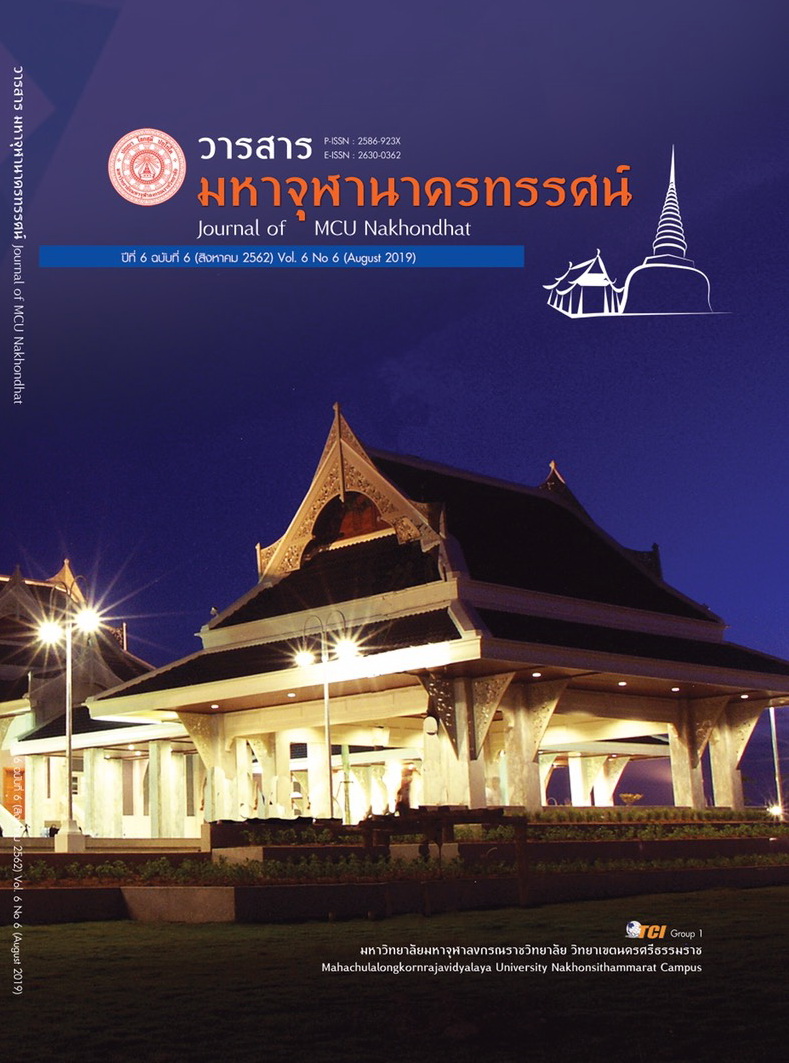APLICATION OF BUDDHIST WISDOM FOR FORESTRY ENVIRONMENTAL MANAGEMENT OF MONK DEVELOPERS
Main Article Content
Abstract
The purposes of this research were 1) To study the Buddhist wisdom for environmental management of the forest. 2)To analyze the practical Buddhist wisdom for environmental management of the forest. 3)To present the guidelines of environmental management in the forest by Buddhist wisdom. This research is a Qualitative Research; the data were gained by informants were Monk developers in the local area, Forest officers, and Park staffs from 17 provinces of 3 regions and Group Discussion of 9 people consist of the academic experts and the government experts in forest conservation.
The results indicated as following details;
- These followed the principles of Buddhism and applied the information to create wisdom for a community in each region, therefore occupation in communities with different types of forest such as Fertile Forest, Dry Forest etc. as this reason in each region has different principles. The Central region followed five precepts and the threefold way in Buddhism for activities, occupation, and unity. Isan region followed the four noble truths and five precepts to support the temple construction, free public meals where was donated consumer goods by the government; included with occupational learning projects, environment conservation activities. Northern region followed perseverance, patience, diligence, a painstaking effort, precept, concentration, intellect, kindliness, and H̄iri o tạp pa in activities by having activity in the forest such as tree ordination as invented tradition, making a Buddha statue in forest.
- Applicability of Buddhist wisdom to environmental management of forest in each region, for example, Central Region followed five precepts and the threefold way in Buddhism. Isan region followed the four noble truths and five precepts, and Northern region followed perseverance, patience, diligence, a painstaking effort, precept, concentration, intellect, kindliness, and H̄iri o tạp pa. the regions were followed in different ways of the principles of Buddhism as different types of forest.
- The guidelines for environmental management in the forest by following the principles of Buddhism were the threefold way in Buddhism, four noble truths, perseverance, patience, diligence, a painstaking effort, precept, concentration, intellect, kindliness, and H̄iri o tạp pa. All of the principles were mentioned to reality in humans, co-existence in society, family, community as all of the units have the principles of Buddhism in their life including environmental management of the forest.
Article Details
How to Cite
ปุณยวุฒิปรีดา ภ. (2019). APLICATION OF BUDDHIST WISDOM FOR FORESTRY ENVIRONMENTAL MANAGEMENT OF MONK DEVELOPERS. Journal of MCU Nakhondhat, 6(6), 2895–2910. retrieved from https://so03.tci-thaijo.org/index.php/JMND/article/view/200327
Section
Research Articles
References
ประพิณวดี ศิริศุภลักษณ์และชนิดา สังขพิทักษ์. (2546). การถือครองที่ดินและการจัดการทรัพยากรธรรมชาติอย่างยั่งยืนในเขตพื้นที่สูงทางภาคเหนือของประเทศไทย: การควบคุมของรัฐ การจัดการชุมชน หรือสิทธิในการใช้ของปัจเจกชน. ใน รายงานฉบับสมบูรณ์ คณะเศรษฐศาสตร์ ศูนย์วิจัยเศรษฐศาสตร์ประยุกต์. มหาวิทยาลัยเกษตรศาสตร์ วิทยาเขตบางเขน.
พระครูพิพิธจารุธรรม, ดร. (2549). แนวทางการอนุรักษ์ป่าตามหลักคำสอนพุทธศาสนาเถรวาท : กรณีมูลนิธิฮักเมืองน่าน. วารสารสันติศึกษาปริทรรศน์ มจร, 3(2), 30-44.
พระครูสังฆรักษ์จักรกฤษ ภูริปญฺโญ, ผศ.ดร. (2562). การจัดการสิ่งแวดล้อมเชิงพุทธ. กรุงเทพมหานคร: จรัลสนิทวศ์การพิมพ์.
พระธรรมปิฎก (ป.อ.ปยุตฺโต). (2552). วิถีชุมชน. กรุงเทพมหานคร: กองทุนหนังสือประเทืองปัญญา มหาวิทยาลัยศรีนครินทรวิโรฒ.
ไพสิฐ พาณิชย์กุล. (2541). พลวัตของชุมชนในการจัดการทรัพยากรสถานการณ์ในประเทศไทย : กฎหมายกับประเพณีท้องถิ่น (ร่วมวิจัย). ใน โครงการวิจัยร่วม. สำนักงานกองทุนสนับสนุนการวิจัย.
พระครูพิพิธจารุธรรม, ดร. (2549). แนวทางการอนุรักษ์ป่าตามหลักคำสอนพุทธศาสนาเถรวาท : กรณีมูลนิธิฮักเมืองน่าน. วารสารสันติศึกษาปริทรรศน์ มจร, 3(2), 30-44.
พระครูสังฆรักษ์จักรกฤษ ภูริปญฺโญ, ผศ.ดร. (2562). การจัดการสิ่งแวดล้อมเชิงพุทธ. กรุงเทพมหานคร: จรัลสนิทวศ์การพิมพ์.
พระธรรมปิฎก (ป.อ.ปยุตฺโต). (2552). วิถีชุมชน. กรุงเทพมหานคร: กองทุนหนังสือประเทืองปัญญา มหาวิทยาลัยศรีนครินทรวิโรฒ.
ไพสิฐ พาณิชย์กุล. (2541). พลวัตของชุมชนในการจัดการทรัพยากรสถานการณ์ในประเทศไทย : กฎหมายกับประเพณีท้องถิ่น (ร่วมวิจัย). ใน โครงการวิจัยร่วม. สำนักงานกองทุนสนับสนุนการวิจัย.


